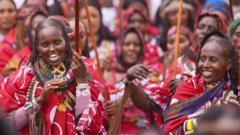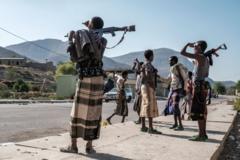The traditional Gada ceremony, celebrated in Arda Jila Badhasa, culminates in the peaceful handover of power every eight years, highlighting the rich heritage and democratic practices of the Borana people.
Thousands Celebrate Gada Ceremony as New Leader Takes Helm in Southern Ethiopia

Thousands Celebrate Gada Ceremony as New Leader Takes Helm in Southern Ethiopia
Cultural festivities mark the transition of leadership in the Borana community's unique democratic system.
In southern Ethiopia, thousands of attendees gathered to witness one of the nation's most significant cultural festivities - the Gada ceremony. This week-long celebration, concluding on Sunday, marks the official passing of authority from one Abbaa Gadaa to his successor, a practice embedded in the Borana community’s traditions for centuries.
Taking place in the rural region of Arda Jila Badhasa near Arero, the event encapsulates a moment to honor their distinctive democracy while showcasing their cultural identity. Participants adorn themselves in various traditional attires, parading the day before the formal transfer during a colorful procession. This features married women brandishing wooden batons, known as "siinqee," which symbolize their protective role in conflicts. If one of these batons is placed on the ground between disputing parties, it signifies that negotiations must cease in deference to the women's authority.
Despite being excluded from holding the position of Abbaa Gadaa, women play a crucial role in the festival, as they provide accommodations for the week-long visitors and prepare food for the community. The Gada governance system, which was inscribed on UNESCO's cultural heritage list in 2016, allows women to participate in community discussions and voice their opinions across the board.
Membership in the Gada system remains exclusive to boys from families already involved in it. Boys begin their training as early as eight, learning about the customs, legalities, and rituals fundamental to the Gada system from oral historians. These young initiates, marked by shaven heads, undergo rigorous assessments including tests on endurance, cattle management, and interpersonal generosity. Head adornments made from cowrie shells are reserved for initiates and revered elderly women, with younger men identified by distinctive ostrich feather headdresses.
The highlight of this year’s Gada ceremony was a ceremonial handover of power from the 48-year-old outgoing Abbaa Gadaa to his younger counterpart, Guyo Boru Guyo, aged 37, a choice made by the council of elders based on impressive teenage contributions to the community. As the newly appointed 72nd Abbaa Gadaa, Guyo will lead the Borana people across both southern Ethiopia and north-western Kenya, inheriting responsibilities as their chief diplomat, tasked with mitigating regional disputes, particularly those pertaining to cattle and water access amid the area’s recurring drought conditions.
Renowned patriarchs and patrons, including the governor of Marsabit county from Kenya, graced the gathering along with attendees who traveled from places like the capital, Addis Ababa, to partake in this vibrant cultural display. With Guyo at the helm for the next eight years, the foundation for leadership transition endures, ensuring continuity within this ancient and revered governance system.
Taking place in the rural region of Arda Jila Badhasa near Arero, the event encapsulates a moment to honor their distinctive democracy while showcasing their cultural identity. Participants adorn themselves in various traditional attires, parading the day before the formal transfer during a colorful procession. This features married women brandishing wooden batons, known as "siinqee," which symbolize their protective role in conflicts. If one of these batons is placed on the ground between disputing parties, it signifies that negotiations must cease in deference to the women's authority.
Despite being excluded from holding the position of Abbaa Gadaa, women play a crucial role in the festival, as they provide accommodations for the week-long visitors and prepare food for the community. The Gada governance system, which was inscribed on UNESCO's cultural heritage list in 2016, allows women to participate in community discussions and voice their opinions across the board.
Membership in the Gada system remains exclusive to boys from families already involved in it. Boys begin their training as early as eight, learning about the customs, legalities, and rituals fundamental to the Gada system from oral historians. These young initiates, marked by shaven heads, undergo rigorous assessments including tests on endurance, cattle management, and interpersonal generosity. Head adornments made from cowrie shells are reserved for initiates and revered elderly women, with younger men identified by distinctive ostrich feather headdresses.
The highlight of this year’s Gada ceremony was a ceremonial handover of power from the 48-year-old outgoing Abbaa Gadaa to his younger counterpart, Guyo Boru Guyo, aged 37, a choice made by the council of elders based on impressive teenage contributions to the community. As the newly appointed 72nd Abbaa Gadaa, Guyo will lead the Borana people across both southern Ethiopia and north-western Kenya, inheriting responsibilities as their chief diplomat, tasked with mitigating regional disputes, particularly those pertaining to cattle and water access amid the area’s recurring drought conditions.
Renowned patriarchs and patrons, including the governor of Marsabit county from Kenya, graced the gathering along with attendees who traveled from places like the capital, Addis Ababa, to partake in this vibrant cultural display. With Guyo at the helm for the next eight years, the foundation for leadership transition endures, ensuring continuity within this ancient and revered governance system.



















